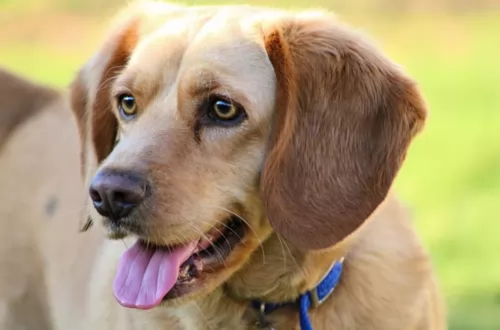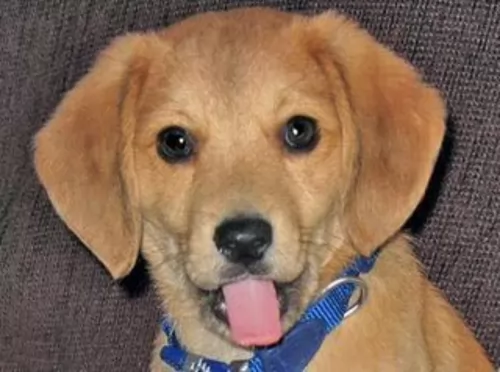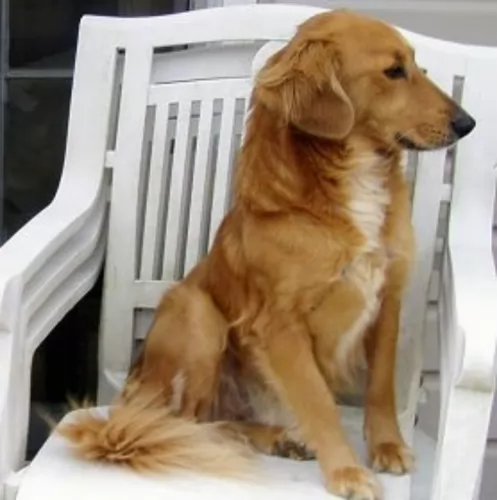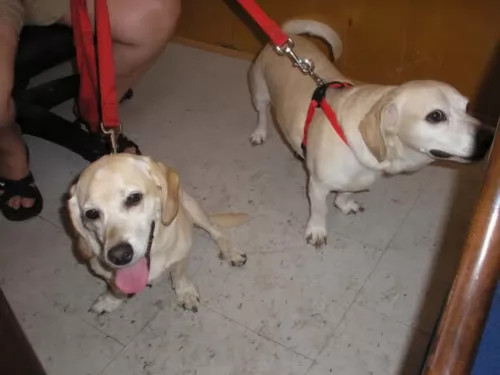 Petzlover
Petzlover Beago is originated from United States but Greyhound is originated from United Kingdom. Beago may grow 35 cm / 13 inches shorter than Greyhound. Beago may weigh 22 kg / 48 pounds lesser than Greyhound. Both Beago and Greyhound has almost same life span. Both Beago and Greyhound has almost same litter size. Beago requires Moderate Maintenance. But Greyhound requires Low Maintenance
Beago is originated from United States but Greyhound is originated from United Kingdom. Beago may grow 35 cm / 13 inches shorter than Greyhound. Beago may weigh 22 kg / 48 pounds lesser than Greyhound. Both Beago and Greyhound has almost same life span. Both Beago and Greyhound has almost same litter size. Beago requires Moderate Maintenance. But Greyhound requires Low Maintenance
 Made up of two purebred dog breeds, the Beagle and the Golden Retriever, Beago is kind of new breed. Some say that they were bred on purpose during the 1980s, in a desire to create a smart and loving dog that will be a smaller size than the Golden Retriever since this will make them ideal for indoor life.
Made up of two purebred dog breeds, the Beagle and the Golden Retriever, Beago is kind of new breed. Some say that they were bred on purpose during the 1980s, in a desire to create a smart and loving dog that will be a smaller size than the Golden Retriever since this will make them ideal for indoor life.
 The Greyhound belongs to a group of dogs known as sighthounds. This is an ancient sighthound breed dating back a few thousands years.
The Greyhound belongs to a group of dogs known as sighthounds. This is an ancient sighthound breed dating back a few thousands years.
The dog has been bred for racing but today is also a popular pet. They’ve also been used for hunting too because of their keen eyesight and sense of smell.
In the United States there are Greyhounds registered with the American Kennel Club as well as those registered with the National Greyhound Association.
 Beago is a medium-sized dog with a usually tri-coloured coat that can vary in some colours. They have usually short hairs because sometimes happens that they have longer hairs if the Golden retriever genes are stronger. Their hairs are soft to the touch and they don’t shed a lot and that makes them easy to maintain. They have dark coloured eyes, floppy ears, and they have the body shape of the Beagle, but they are very active and muscular like the Golden Retriever.
Beago is a medium-sized dog with a usually tri-coloured coat that can vary in some colours. They have usually short hairs because sometimes happens that they have longer hairs if the Golden retriever genes are stronger. Their hairs are soft to the touch and they don’t shed a lot and that makes them easy to maintain. They have dark coloured eyes, floppy ears, and they have the body shape of the Beagle, but they are very active and muscular like the Golden Retriever.
 The Greyhound is a tall, muscled, long-legged, slender dog with a flexible spine, a deep chest and exceptional eye sight.
The Greyhound is a tall, muscled, long-legged, slender dog with a flexible spine, a deep chest and exceptional eye sight.
The Males are usually about 71 to 76 cm in height with the females being slightly smaller. The dogs weigh in the region of 27 to 40 kg. The coat of the dog is short and smooth and is found in an assortment of colors, from fawn to white, tan, black and brindle.As far as grooming goes, he is looked upon as a low maintenance breed.
He has a long narrow muzzle, semi-erect/semi-floppy short ears and a long slender tail.
Sometimes referred to as being hypoallergenic, you need to allow your Greyhound indoors as the dog doesn't have an undercoat. He is therefore more susceptible to extreme temperatures. The face is long, narrow and pointed, the ears short and half-erect-half-floppy with a long, thin, whip-like tail.
Intelligent and gentle, the Greyhound is described by those who have owned them as wonderful pet. They are somewhat aloof around strangers but love their own human family. This is a non-aggressive, gentle, docile, calm dog. They are loving and get on well with their entire family, whether human beings or pets.
They’re sensitive dogs who appreciate quiet, calm environments. They may be quiet, but they are still social, loving the company of their family. They’re not great barkers and because they are non-aggressive, they don’t make wonderful guard dogs.
 They are very good with children of all age.
They are very good with children of all age.
Hunting, search, rescue dog, agility competitions.
Beago will love living in a house with a bog yard. As well, he will have a happy life in the apartments as long as you take him out for his daily activity. They get along with other pets, so any other dog or cat will be great company for him. They are usually well mannered in public places, if you train them and socialize, but they will always bark if there is someone strange in your house. They are very good with children of all age.
Beage is very smart breed. They will pick up new tricks very quickly and remember it forever. They would love learning new tricks once you include treats as rewards, but you must be careful not to overfeed him.
 The Greyhound, forgetting about the racing part, makes a superb pet too. He won't do well in a household where there are screaming, noisy children and adults as he wants a quiet home to live in.
The Greyhound, forgetting about the racing part, makes a superb pet too. He won't do well in a household where there are screaming, noisy children and adults as he wants a quiet home to live in.
He can get on well with kind, gentle, respectful children as well as with pets in the home. Just like any dog, he will also need training and socialization as this can build up his confidence and then he knows how to please his owners and what they expect.
The Greyhound will require a gentle, fair, kind owner who understands his need for peace and quiet, and then he becomes a most wonderful devoted, loyal and loving pet.
 There are no general health issues with this breed. The health history shows that they have common health problems as any other active dog – problems with hips and elbows. Because of their floppy ears, they are prone to infections and diseases caused by lack of ear hygiene. Some of them have skin allergies. The best advice is always to make regular vet checks. Then you and your Beago can live a happy and long life.
There are no general health issues with this breed. The health history shows that they have common health problems as any other active dog – problems with hips and elbows. Because of their floppy ears, they are prone to infections and diseases caused by lack of ear hygiene. Some of them have skin allergies. The best advice is always to make regular vet checks. Then you and your Beago can live a happy and long life.
 Greyhounds are a wonderfully healthy dog breed and with good care can reach 14 years of age. They aren't prone to many genetic illnesses and unlike so many other dog breeds, this is one dog that doesn't battle with hip dysplasia – in fact it is almost unknown among this tall, slim dog breed.
Greyhounds are a wonderfully healthy dog breed and with good care can reach 14 years of age. They aren't prone to many genetic illnesses and unlike so many other dog breeds, this is one dog that doesn't battle with hip dysplasia – in fact it is almost unknown among this tall, slim dog breed.
The Greyhound does however, have a deep chest and this is what makes him vulnerable to bloat or gastric torsion. You have to take action quickly if you detect bloat – the stomach swells up – as this is a life-threatening condition that can occur quickly when air is trapped in the stomach. The stomach can become twisted.
Make sure your Greyhound doesn't gobble his food too quickly and preferably give him smaller meals as opposed to one or two large bowls of food.
 The best tip is to feed them with quality dry food. Canned food can be given once in week or less. They will love cheese and meat in their meal. Since they like to munch, they will eat almost any raw fruit or vegetables. Until you Beago is six months old, feed him tree time per day. Keep the feeding schedule unchanged to form a habit and avoid problems with metabolism.
The best tip is to feed them with quality dry food. Canned food can be given once in week or less. They will love cheese and meat in their meal. Since they like to munch, they will eat almost any raw fruit or vegetables. Until you Beago is six months old, feed him tree time per day. Keep the feeding schedule unchanged to form a habit and avoid problems with metabolism.
Since they don’t shed a lot, grooming your Beago will be easy. They won’t need an everyday brush, but it will be good if you could brush him two times per week and bathe once in a month. Their floppy ears need regular care as well. They need to be cleaned with the ear cleaning solution at least once a week. They will need regular nail trimming as well. They need quality food because they are very active dogs. Make sure not to overfeed them. Daily activity is a must.
Beago is very active breed. They like to spend time outdoors, running, playing fetch, jumping. They will love visiting the dog park or any park that is close to your house. They are very good if taken hiking.
 Your Greyhound’s breeder will be the best guide for the type of- and the amount of dog food your hound will need. Of course, a growing puppy has different nutritional needs from a mature or senior Greyhound.
Your Greyhound’s breeder will be the best guide for the type of- and the amount of dog food your hound will need. Of course, a growing puppy has different nutritional needs from a mature or senior Greyhound.
Growing puppies and young dogs use a lot of energy so they will require a diet rich in protein. According to Greyhound experts, an adult Greyhound dog will need an average daily caloric intake of 1740 calories.
Older dogs and those that have been spayed or neutered will need less. Apart from the very best quality kibble, your Greyhound will most certainly require raw meat from time to time. You can also give him some cooked chicken, vegetables and brown rice. He should have access to a constant supply of fresh, cool water.
The Greyhound's coat is smooth and short and he sheds very little so he will only need a gentle brush-down once or twice a week.
Having a relaxed lifestyle is what your Greyhound will love. He is a dog that needs to spend time indoors. When outdoors, whether you live in the city or the country, he will need daily walks and a run in the park regularly.
Just because he is a sprinter, it isn't wise to take him with you with cycling or jogging as he is geared for a short burst of speed as opposed to a long run.